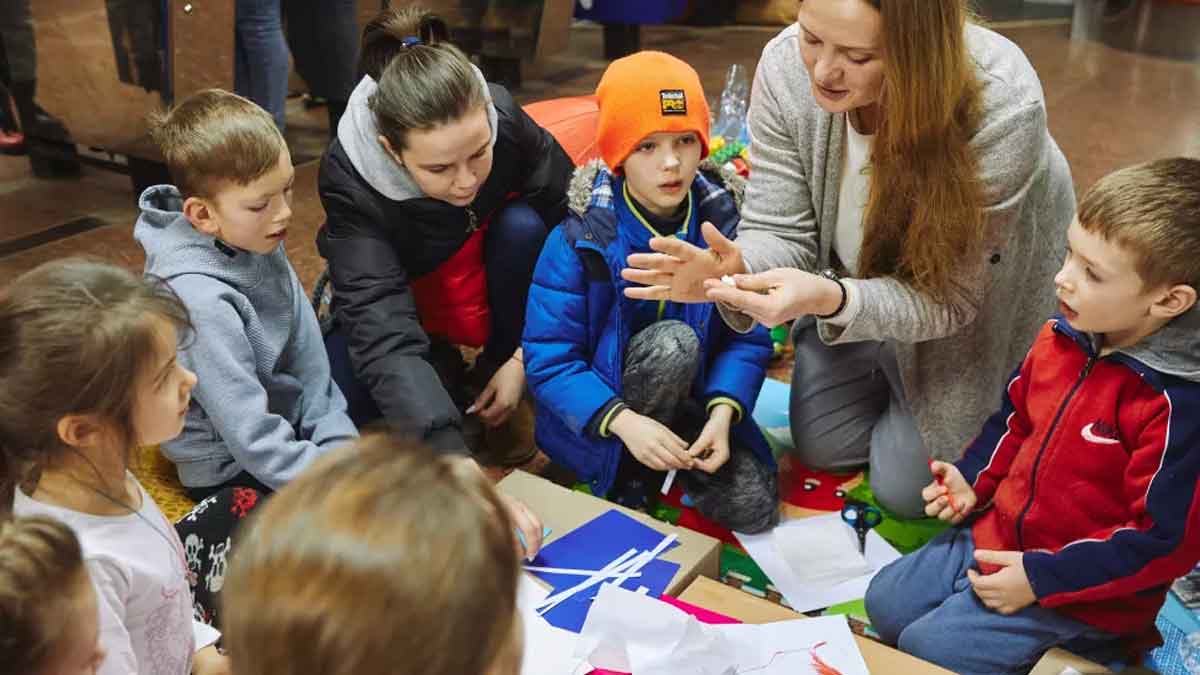- Home
- Billionaires
- Investing Newsletters
- 193CC 1000
- Article Layout 2
- Article Layout 3
- Article Layout 4
- Article Layout 5
- Article Layout 6
- Article Layout 7
- Article Layout 8
- Article Layout 9
- Article Layout 10
- Article Layout 11
- Article Layout 12
- Article Layout 13
- Article Layout 14
- Article Sidebar
- Post Format
- pages
- Archive Layouts
- Post Gallery
- Post Video Background
- Post Review
- Sponsored Post
- Leadership
- Business
- Money
- Small Business
- Innovation
- Shop
Recent Posts
UNICEF Stays Committed to Ukraine’s Children During 2-Year War

UNICEF’s Continuous Support for Ukraine’s Children Amidst 2-Year War As Ukraine’s conflict enters its third year, children and families face ongoing displacement, violence, and hardship. UNICEF remains steadfast in delivering essential services and support, alongside government relief efforts. Here’s an overview of UNICEF’s response, which reached 8.76 million people, including nearly 3 million children, with humanitarian assistance in 2023.
Since the escalation of war in February 2022, Ukraine’s children and families have endured displacement, loss, and relentless violence. UNICEF has been a crucial part of the humanitarian response from the beginning, scaling up emergency operations alongside partners inside Ukraine and in refugee transit and destination countries.
More than 5.9 million people have fled Ukraine for safety in neighboring host countries and beyond, marking the largest displacement of people in Europe since World War II. Additionally, over 3.7 million people remain internally displaced. Active fighting continues in many communities in the east and south, with an estimated 2.9 million people living at or near the front lines.
Children have borne a heavy toll, with 579 children killed and 1,284 injured since February 2022. Thousands of schools, hospitals, and homes have been damaged or destroyed, along with critical water and energy infrastructure, putting children’s lives at risk.
Despite these challenges, UNICEF continues to work tirelessly to meet the needs of the most vulnerable children and families, including refugees who have returned home. UNICEF’s efforts focus on ensuring access to health care, immunization, nutrition support, protection, education, safe water and sanitation, social protection, and mental health and psychosocial support.
In 2023, UNICEF participated in over 100 UN inter-agency relief convoys, reaching hundreds of thousands of people in the most affected areas. Through these and other interventions, UNICEF reached 8.76 million people, including 2.96 million children, with life-saving assistance.
One key area of focus for UNICEF is ensuring access to health care. Since the escalation of war, there have been 1,567 attacks on health care in Ukraine, leaving many facilities damaged or destroyed. In 2023, UNICEF supported access to health care for over 5 million children and women by delivering supplies and equipment to health care facilities, equipping neonatal ambulances, rehabilitating shelters in hospitals, and providing home visits by nurses and doctors.
UNICEF also continues to support child immunization, procuring large quantities of vaccine doses to protect children from preventable diseases like measles. In Ukraine, UNICEF is helping to expand the reach of local and national vaccination campaigns through mobile health teams.
Another critical area of UNICEF’s response is providing safe water and sanitation. Even before the conflict escalated, millions of Ukrainians lacked access to safe water and sanitation. In the past two years, UNICEF ensured safe access to water, sanitation, and hygiene for 5.4 million people across 112 communities, including over 910,000 children, by repairing and rehabilitating water and sanitation networks.
UNICEF’s efforts also extend to supporting children’s mental health and well-being, as well as their access to education. Over the past two years, children in frontline areas have experienced prolonged disruptions to their schooling and daily routines, leading to a mental health crisis and a learning crisis among Ukraine’s children. UNICEF reached 2.5 million children and caregivers inside Ukraine, and another 1.3 million children and caregivers in countries hosting refugees, with mental health and psychosocial support interventions in 2023.
Education remains a major concern, with 40 percent of Ukraine’s children unable to attend school consistently. UNICEF helped more than 1.45 million children inside Ukraine access education in 2023, including early learning, in both formal and non-formal settings, and helped 1.26 million refugee children access education in host countries.
In addition to these efforts, UNICEF continues to focus on protection programs, including gender-based violence prevention and response, and mine risk education. UNICEF reached 1.1 million girls, boys, and women at risk of GBV, including over 7,500 children with disabilities, with GBV prevention, risk mitigation, and response services in 2023.
Despite the challenges, UNICEF remains committed to helping children in Ukraine whose lives have been upended by the war. With donor support, UNICEF will continue to advocate for unimpeded humanitarian access and a sustainable recovery to support the realization of children’s rights in Ukraine.
Recent Posts
Categories
- 193cc Digital Assets2
- 5G1
- Aerospace & Defense45
- AI33
- Arts3
- Banking & Insurance11
- Big Data3
- Billionaires308
- Boats & Planes1
- Business315
- Careers13
- Cars & Bikes74
- CEO Network1
- CFO Network17
- CHRO Network1
- CIO Network1
- Cloud10
- CMO Network18
- Commercial Real Estate7
- Consultant1
- Consumer Tech171
- CxO1
- Cybersecurity59
- Dining1
- Diversity, Equity & Inclusion4
- Education7
- Energy8
- Enterprise Tech29
- Events11
- Fintech1
- Food & Drink2
- Franchises1
- Freelance1
- Future Of Work2
- Games141
- GIG1
- Healthcare77
- Hollywood & Entertainment175
- Houses1
- Innovation41
- Investing2
- Investing Newsletters4
- Leadership65
- Lifestyle11
- Manufacturing1
- Markets20
- Media189
- Mobile phone1
- Money13
- Personal Finance2
- Policy554
- Real Estate1
- Research6
- Retail1
- Retirement1
- Small Business1
- SportsMoney30
- Style & Beauty1
- Success Income1
- Taxes2
- Travel10
- Uncategorized8
- Vices1
- Watches & Jewelry2
- world's billionaires278
Related Articles
Tim Walz Tops JD Vance in Favorability Ahead of Debate
As the political landscape heats up ahead of the upcoming vice presidential...
By 193cc Agency CouncilSeptember 26, 2024Harris vs. Trump: A Close Contest as Polls Indicate Narrow Leads
The upcoming election is shaping up to be a fierce battle between...
By 193cc Agency CouncilSeptember 26, 2024Musk Threatens Apple Device Ban Over OpenAI Integration
Elon Musk, known for his ventures such as Tesla, SpaceX, and OpenAI,...
By 193cc Agency CouncilJune 11, 2024Trump Hails NYPD’s Clearing of Columbia Encampment
Former President Donald Trump offered high praise for the New York Police...
By 193cc Agency CouncilMay 2, 2024















Leave a comment